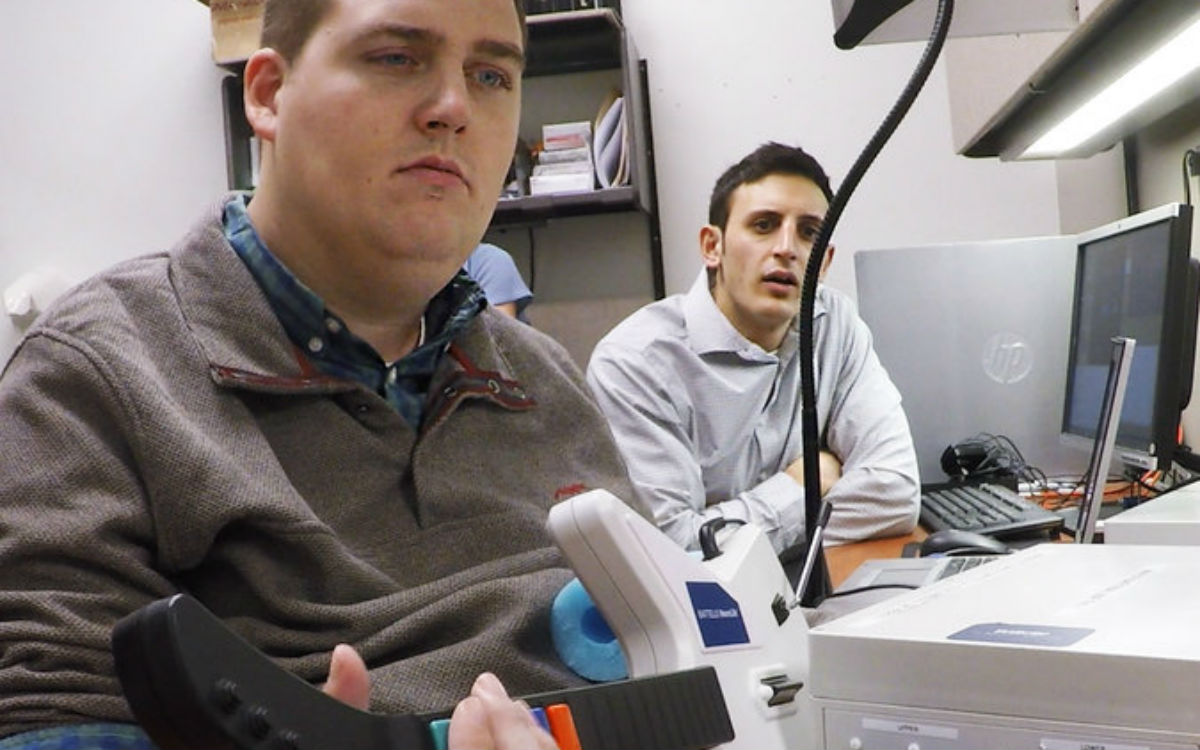Paralysed man plays Guitar Hero using mind control
Computer chip implant allows quadriplegic to move his hand and fingers for first time in six years

A free daily email with the biggest news stories of the day – and the best features from TheWeek.com
You are now subscribed
Your newsletter sign-up was successful
A quadriplegic in the US has become the first recipient of a brain implant allowing him to move his fingers again.
Ian Burkhart was left paralysed below his elbows and unable to walk following a diving accident six years ago.
Now, with the help of a computer chip implant and an electronic sleeve, he is able to grasp and move large objects and even play video game Guitar Hero. [[{"type":"media","view_mode":"content_original","fid":"93480","attributes":{"class":"media-image"}}]]
The Week
Escape your echo chamber. Get the facts behind the news, plus analysis from multiple perspectives.

Sign up for The Week's Free Newsletters
From our morning news briefing to a weekly Good News Newsletter, get the best of The Week delivered directly to your inbox.
From our morning news briefing to a weekly Good News Newsletter, get the best of The Week delivered directly to your inbox.
The implant reads Burkhart's brain signals and decodes them using a computer before stimulating the muscles in his arm via the electrode-covered sleeve.
The system is imprecise and requires incredible levels of concentration from the 24-year-old from Ohio.
"Initially we'd do a short session and I'd feel mentally fatigued and exhausted, like I'd been in a six or seven-hour exam," said Burkhart.
"For 19 years of my life I took it for granted: I think and my fingers move. But with more and more practise it became much easier. It's second nature."
A free daily email with the biggest news stories of the day – and the best features from TheWeek.com
Despite the breakthrough, the new technology is not a cure for paralysis, says the New York Times. Burkhart can use his hand "only when connected to computers in the lab, and the researchers said there was much work to do before the system could provide significant mobile independence", reports the paper.
Nevertheless, Burkhart remained positive. "Right now, it's only in a clinical setting, but with enough people working on it and enough attention, it can be something I can use outside of the hospital, at my home and outside my home and really improve the quality of my life," he said.
The scientists' study, published in the science journal Nature, marks a significant moment in the field of using computers to bypass spinal cord injuries, says the BBC.
"This really provides hope, we believe, for many patients in the future as this technology evolves and matures to help people who have disabilities to allow them to be more functional and more independent," said Ali Rezai, the neurosurgeon who implanted the chip in Burkhart's brain.
"Ten years ago we couldn't do this. Imagine what we can do in another ten."
-
 The environmental cost of GLP-1s
The environmental cost of GLP-1sThe explainer Producing the drugs is a dirty process
-
 Greenland’s capital becomes ground zero for the country’s diplomatic straits
Greenland’s capital becomes ground zero for the country’s diplomatic straitsIN THE SPOTLIGHT A flurry of new consular activity in Nuuk shows how important Greenland has become to Europeans’ anxiety about American imperialism
-
 ‘This is something that happens all too often’
‘This is something that happens all too often’Instant Opinion Opinion, comment and editorials of the day
-
 Epstein files topple law CEO, roil UK government
Epstein files topple law CEO, roil UK governmentSpeed Read Peter Mandelson, Britain’s former ambassador to the US, is caught up in the scandal
-
 Iran and US prepare to meet after skirmishes
Iran and US prepare to meet after skirmishesSpeed Read The incident comes amid heightened tensions in the Middle East
-
 Israel retrieves final hostage’s body from Gaza
Israel retrieves final hostage’s body from GazaSpeed Read The 24-year-old police officer was killed during the initial Hamas attack
-
 China’s Xi targets top general in growing purge
China’s Xi targets top general in growing purgeSpeed Read Zhang Youxia is being investigated over ‘grave violations’ of the law
-
 Panama and Canada are negotiating over a crucial copper mine
Panama and Canada are negotiating over a crucial copper mineIn the Spotlight Panama is set to make a final decision on the mine this summer
-
 Why Greenland’s natural resources are nearly impossible to mine
Why Greenland’s natural resources are nearly impossible to mineThe Explainer The country’s natural landscape makes the task extremely difficult
-
 Iran cuts internet as protests escalate
Iran cuts internet as protests escalateSpeed Reada Government buildings across the country have been set on fire
-
 US nabs ‘shadow’ tanker claimed by Russia
US nabs ‘shadow’ tanker claimed by RussiaSpeed Read The ship was one of two vessels seized by the US military